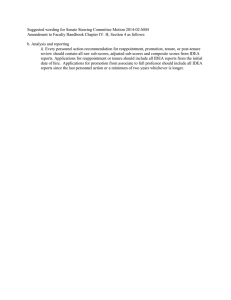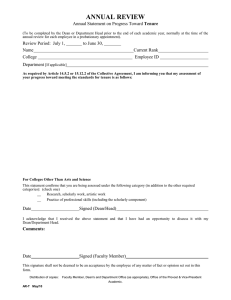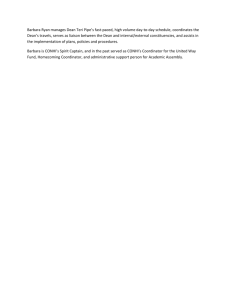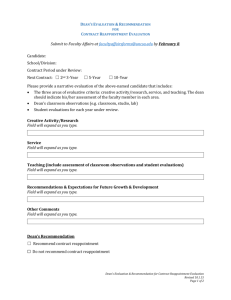ASSOCIATED AREA OF PHILOSOPHY AND RELIGION TENURE, PROMOTION, AND REAPPOINTMENT CRITERIA
advertisement
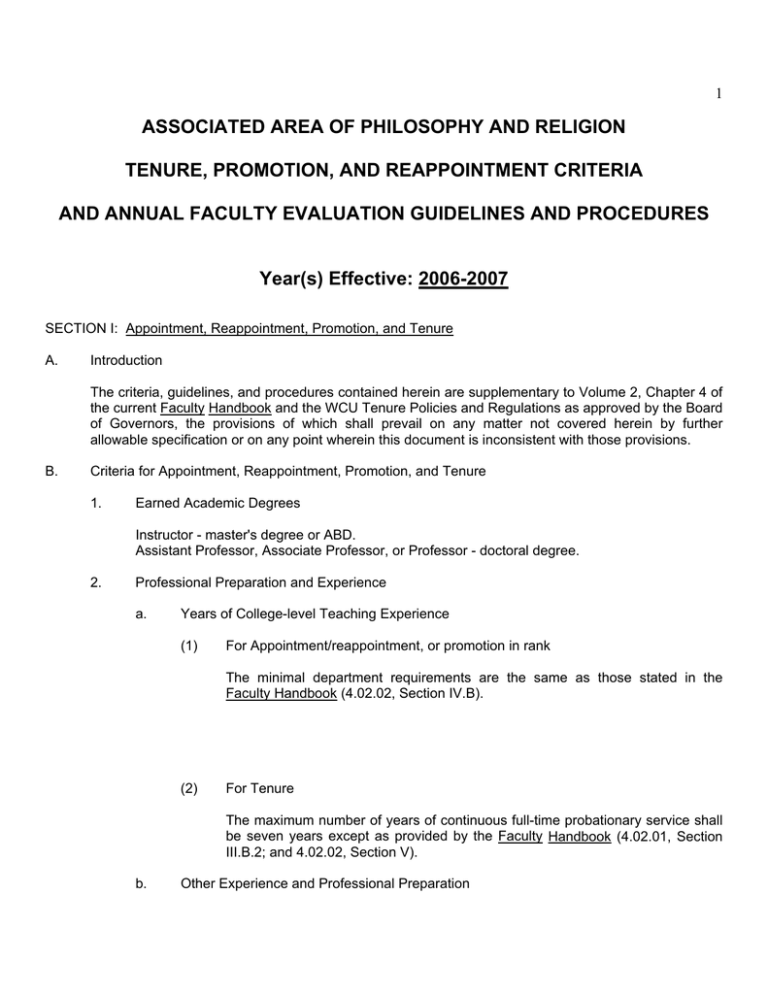
1 ASSOCIATED AREA OF PHILOSOPHY AND RELIGION TENURE, PROMOTION, AND REAPPOINTMENT CRITERIA AND ANNUAL FACULTY EVALUATION GUIDELINES AND PROCEDURES Year(s) Effective: 2006-2007 SECTION I: Appointment, Reappointment, Promotion, and Tenure A. Introduction The criteria, guidelines, and procedures contained herein are supplementary to Volume 2, Chapter 4 of the current Faculty Handbook and the WCU Tenure Policies and Regulations as approved by the Board of Governors, the provisions of which shall prevail on any matter not covered herein by further allowable specification or on any point wherein this document is inconsistent with those provisions. B. Criteria for Appointment, Reappointment, Promotion, and Tenure 1. Earned Academic Degrees Instructor - master's degree or ABD. Assistant Professor, Associate Professor, or Professor - doctoral degree. 2. Professional Preparation and Experience a. Years of College-level Teaching Experience (1) For Appointment/reappointment, or promotion in rank The minimal department requirements are the same as those stated in the Faculty Handbook (4.02.02, Section IV.B). (2) For Tenure The maximum number of years of continuous full-time probationary service shall be seven years except as provided by the Faculty Handbook (4.02.01, Section III.B.2; and 4.02.02, Section V). b. Other Experience and Professional Preparation 2 Scholarly and/or instructional expertise in more than one discipline will be considered as professional preparation which benefits the university as well as the individual. 3. Quality and Effectiveness of Teaching Teaching will be evaluated by means of (1) Evaluation by the area coordinator (2) Course syllabi, texts, assignments, and/or exams (3) Student evaluations; sample questionnaire attached 4. Evidence of Scholarly Activity a. Research and Publications A copy of each publication or paper and related material (e.g. published reviews of books or responses to articles, letters from editors, and so on) should be included in the candidate's file. (1) (2) (3) (4) (5) Publications, such as books, articles in refereed journals, and signed, critical book reviews Scholarly papers presented at meetings of professional societies Grants, awards, and participation in professional institutes providing the selection process is competitive Brief, unsigned book reviews Invitations to be a commentator or panelist at meetings of professional societies b. Creative Works and Projects c. Professional Activities, including Participation, Contributions, and Recognition of Achievement Service in an office or on a committee of a professional society. d. 5. Other Evidence of Professional Growth and Leadership Quality of Role in, and Special Contributions to Institutional Affairs a. Off-campus Instruction and Regional Service b. Work with Students (1) (2) (3) Availability to students Providing academic assistance to students outside the classroom Advising majors, minors, and others 3 (4) c. Activities at the Departmental, School, and University Levels (1) (2) 6. Advising and/or participating in student organizations Service on university, school, and department committees Cooperation in responding to emergencies Promise for Sustained Future Professional Achievement In its consideration of each candidate, the department shall assess and be guided by the individual's promise for sustained future professional achievement based upon the cumulative record in all of the categories listed above. Recommendations for appointment/reappointment and promotion to a rank shall be consistent with the provisions of the Faculty Handbook (4.02.02, Section IV.C). A recommendation for the conferral of permanent tenure must be based on a thorough assessment of the candidate's cumulative record and promise for sustained achievement. 7. Institutional Needs and Resources All recommendations on appointment/reappointment, promotion, and tenure shall be consistent with the needs and resources of the department. C. Composition of the Department Reappointment, Promotion, and Tenure Committee The departmental advisory committee shall be constituted in a manner consistent with the provisions of the Faculty Handbook (4.02.02, Section VI.A). D. Procedures 1. Preparation of the Files of the Candidates Files on each candidate shall be prepared according to university guidelines. 2. Procedures of the Departmental Advisory Committee on Reappointment, Promotion and Tenure be in accord with the Faculty Handbook (4.02.02, Section VI.D). 3. Other Procedures During and at the End of the Annual Consideration Process a. Each member of the area of philosophy and religion who is eligible for reappointment, promotion, and/or tenure may appear before the area committee for the purpose of making an oral presentation concerning his or her research, writing, or methods of instruction and for answering questions from the committee. b. An appeal of a negative decision (request for reconsideration) may be initiated at the conclusion of the consideration process as provided by the Faculty Handbook (4.02.01, Sections VI and VII). SECTION II: Annual Faculty Evaluation 4 A. B. C. Purposes 1. To assist faculty members to know how their work is being evaluated 2. To assist faculty members to bring their work to a high level of professional quality 3. To promote the continuing Scholarly Activity of faculty members 4. To provide a professional basis for assessments when decisions regarding the status of the faculty member are being made General Guidelines 1. Supplemental to the annual appointment/reappointment, promotion and tenure process, the department shall complete an evaluation of its faculty members each spring semester. 2. As a minimal condition each faculty member in the department shall be evaluated on the same criteria and by the same processes. Criteria for the Evaluation 1. 2. The criteria by which the faculty members will be evaluated are: a. Effectiveness as a teacher, as evidenced by content expertise, instructional delivery skills, design of course materials, classroom arbitration skills, evaluation of student work, faculty/student relationships, and general promotion of student learning. b. Effectiveness as a producer of scholarly works, researcher, creative artist, and performer. c. Service to the university at the several levels and to students d. Service to the community and region e. Other skills, abilities, contributions, or roles that are highly valued by the department. Scholarly and/or instructional expertise in more than one discipline will be considered as professional preparation which benefits the university as well as the individual. Criteria Emphases The criteria in C. 1. are listed in order of significance. D. Methods or approaches to be used for evaluation of the faculty member on each of the criteria 5 1. Design of the evaluation plan Teaching, scholarship, service, and professional achievements will be evaluated by the following means. Teaching a. b. c. d. e. f. Coordinator's conference with faculty member; direct observation of teaching of new and non-tenured faculty; no graduate assistants teach in this area Course syllabi, texts, assignments, and/or exams Student evaluations at regular intervals; sample questionnaire attached Academic assistance provided to students outside the classroom Additional information which the faculty member wishes to present The coordinator's classes will be open to observation by department faculty Scholarship a. b. c. d. e. f. Publications, such as books, articles in refereed journals, and signed, critical book reviews Scholarly papers presented at meetings of professional societies Grants, awards, and participation in professional institutes providing the selection process is competitive Brief, unsigned book reviews Invitation to be a commentator or panelist at meetings of professional societies Additional data which the faculty member wishes to present, such as changes in degree status since the last AFE Service a. b. c. d. e. Service on university, school, and department committees Advising of students Cooperation in responding to emergencies Off-campus instruction Civic activities insofar as they are related to professional expertise Professional Achievements Service in an office or on a committee of a professional society 2. Instruments to be used in carrying out the plan a. Student evaluations will be conducted in at least half of the faculty member's classes during both the fall and spring semesters. The evaluations should be conducted at both lower division and upper division level courses. A sample questionnaire is attached. b. Student evaluations for all instructors, once completed, are to be submitted directly to 6 the coordinator, who will review them and return them to the instructor by the beginning of the next grading period. c. E. Procedures 1. Notification of faculty of AFE criteria and procedures 2. At the request of either the coordinator or faculty member, a preevaluation conference between the coordinator and faculty member at least four weeks prior to the coordinator's preparation of the written evaluation. 3. Faculty preparation and collection of written documents including student evaluations. sample questionnaire is attached. 4. Coordinator's preparation of the written evaluation and delivery to faculty at least one week before the evaluation conference. 5. Evaluation conference between coordinator and faculty member 6. F. The coordinator will complete an evaluation form with explanations for each faculty member. The evaluation will be based on the criteria at D. 1. above. (See the attached copy of the coordinator's evaluation form.) A a. Discussion of evaluation including its relation to previous evaluations b. When necessary the formal establishment of goals c. Discussion of ways to improve performance. At the request of either the faculty member or the department head, a written summary of this consultation shall be prepared by the department head and shared with the faculty member. As a minimal requirement the faculty member should sign the summary to indicate receipt of it, but should be provided the added opportunity of * replying to indicate acceptance of it or of providing a rebuttal to be attached to the department head's summary. * This process shall be conducted in a timely manner so that the AFE can be sent to the dean by the end of the spring semester. d. Cosigning of the AFE. * Appeal to the Dean of Arts and Sciences for a second evaluation * The year's AFE results in the department shall be prepared and submitted to the dean by the end of the spring semester. * --- * These actions are entirely optional and failure to take them does not necessarily imply complete agreement with the coordinator's evaluation. SECTION III: Preparation and Implementation 7 A. Preparation and Approval 1. These criteria, guidelines, and procedures shall be prepared or reviewed and revised each spring semester for the next academic year. Each year the AFE procedures for Philosophy and Religion will be reviewed for the purpose of recommending revisions to the coordinator. The review will be conducted by an area Committee of the Whole with the coordinator serving as a non-voting chairman. 2. B. On the timetable announced by the dean, the document shall be submitted to the dean for review. The dean shall endorse the document or recommend revisions. The deans should forward the approved documents to the VCAA for review, only when the dean is satisfied as to the quality and completeness of the document. The VCAA will approve the document or recommend revisions and return it to the dean and program coordinator will resubmit the revised document for approval through channels as before. Implementation 1. This document becomes effective for the 2003-2004 academic year immediately following its preparation or revision upon endorsement by the dean and approval by the VCAA. Approved: Program Coordinator Date Dean Date Provost Date 8 AFE Form Associated Area of Philosophy and Religion Annual Faculty Evaluation for ---Faculty Member's Name---, 20XX-XX 1. Teaching a. b. c. d. e. 2. Scholarship a. b. c. d. e. f. 3. Publications: Scholarly papers; Grants and other awards: Unsigned book reviews: Invitations to be commentator or panelist: Additional information: Service a. b. c. d. e. 4. Coordinator's conference: Course syllabi, texts, assignments, and/or exams: Student evaluations: Academic assistance outside classroom: Additional information: Service on committees: Advising of students Cooperation in responding to emergencies: Off-campus instruction: Civic activities: Professional Service to professional societies: 9 (The above items will be ranked as Excellent, Very Good, Good, Fair (Needs Improvement), or Poor, and/or given a written explanation.) (When necessary a program outlining future goals and/or actions which need to be taken to improve performance will be stated here.) Signature - Faculty Member Date Signature - Coordinator Date
